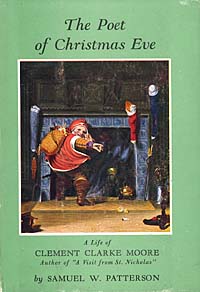 |
|
| Historical Articles | Chronological Articles |
|
Historical Arguments for Henry Livingston, Jr. as the Author of "Night Before Christmas" |
|
By James Aldredge |
|
ON Christmas eve this year people will again gather at Trinity cemetery in uptown New York and sing carols beside the grave of Dr. Clement C. Moore. Most anthologists credit him with the authorship of that most popular of all Christmas poems which begins: 'Twas the night before Christmas, when all through the house Suppose, in the midst of those ceremonies, somebody should loudly speak up that Dr. Moore was not the author at all! One can imagine the uproar and confusion that would follow. Yet, for many years back, the descendants of Maj. Henry Livingston have always claimed that their genial ancestor wrote those verses. If this idea sounds fantastic, it is only necessary to consider the facts. The late Burton E. Stevenson, the widely noted anthologist, devoted a whole chapter of his book "Famous Single Poems" to the "St. Nicholas" controversy. WHO was Livingston, anyway? He was a member of an old Hudson river family, a clever poet in his own right, and about as informal and hilarious as any gentleman-farmer could be. As a country squire, he commanded wide respect, for citizens of the locality made him a justice of the peace. But the skylarking major never took himself too seriously. Wherever he went, he was undoubtedly the life of the party. And what a gay, sprightly image the major put forth with his pen! Time and again, when he would start writing a letter to relatives or friends, he would switch to poetry, and the result was that he would break out with some of the gayest, most rollicking verses ever written by an amateur. He was almost always in a bantering mood when he wrote his brother Beekman who was a storekeeper at New Lebanon: To my dear brother Beekman I sit down to write The Major then imparts the latest social news: Now for news, my sweet fellow - first learn with a sigh In later years the Livingston heirs treasured carefully a manuscript volume of the major's poems. There were forty-five altogether, and of that number, nineteen were in the same meter as the beloved "A Visit from St. Nicholas." But when one examines Dr. Moore's collected poems, one finds only one sample of this particular meter, and that a lame, stilted effort at best. Turning to the lines on Santa Claus, one discovers that Major Livingston's favorite exclamation is bestowed on two of the old saint's reindeer. Another argument for his authorship is found in the reference to "mamma in her 'kerchief"; when he spoke of his wife, the major invariably used this term. THERE WILL always be a great mystery about the origin of the famous poem. Close friends of the versatile major insisted they heard him read it aloud to his children {Corr: Henry's children and his daughter-in-law made that claim), somewhere around 1805, in his ancestral home. His daughter, Mrs. Smith Thompson, also was quick to point out that "the style was exactly like Father's when he felt in a humorous mood." A grandson, Henry Livingston, only added to the mystery when he told how the major's original manuscript had gone up in smoke when his sister's home at Waukesha, Wis., had been destroyed by fire. For more than a quarter of a century, Dr. Moore, who now enjoys the reputation for the poem's authorship, occupied his solemn chair as professor of Oriental languages at the General Theological seminary in New York. In writing his general style was as correct and sedate as the Hebrew-English dictionary which brought him fame during his lifetime. Could he have cut loose, for once, in those rollicking Christmas verses? His other poetry doesn't seem to prove it. In character, it is too stiff and stilted - it lacks the gay spontaneity of even the major's rhymed letters. The biggest mystery surrounds the original publication of the poem. It came out as an unsigned contribution in the Troy (New York) Sentinel on December 23, 1823. Therefore, the author's name was completely missing. A copy of the poem is said to have been sent to the paper by a Miss Harriet Butler, a minister's daughter, who was a Christmas visitor to Dr. Moore's home in New YOrk. But Major Livingston's daughter said the same lady had previously been a guest at her father's place (Corr: The Livingston story is that a lady was a guest at the Livingston's, not the same lady.), and there he had allowed her to copy off the lines on the Christmas morning when he read them aloud to his children. The plot thickens, as they say - and the entire situation gets hazier with the passing of the years. As for Dr. Moore, there seems to be no evidence that he ever claimed to have written the famous verses. The poem was included in a book called "The Collected Poems of C. C. Moore," but investigation proves that volume contained several other poems of which Dr. Moore was not the author. They had appeared anonymously in English literary journals. "A Visit from St. Nicholas" is stuck away in the back pages, as though it had been dropped in merely to pad out the book. At the bottom, there is simply this note: "A poem written many years ago - C.C. Moore." That, and nothing more. Whatever conclusions one may wish to draw, it is plain as berries on a holly bush that Major Livingston dashed off nobody knows how many verses in the same rollicking vein. Anyone reading his gay letters in rhyme would have to concede it would have been no effort at all for him to have turned out the famous poem in question. Perhaps he really did write it! Who knows?
|


![]() Copyright © 2014, InterMedia Enterprises
Copyright © 2014, InterMedia Enterprises